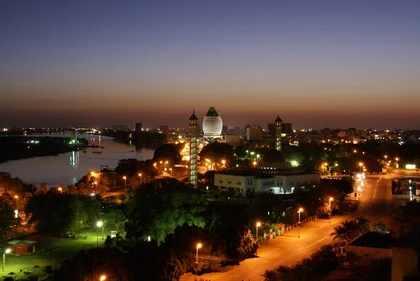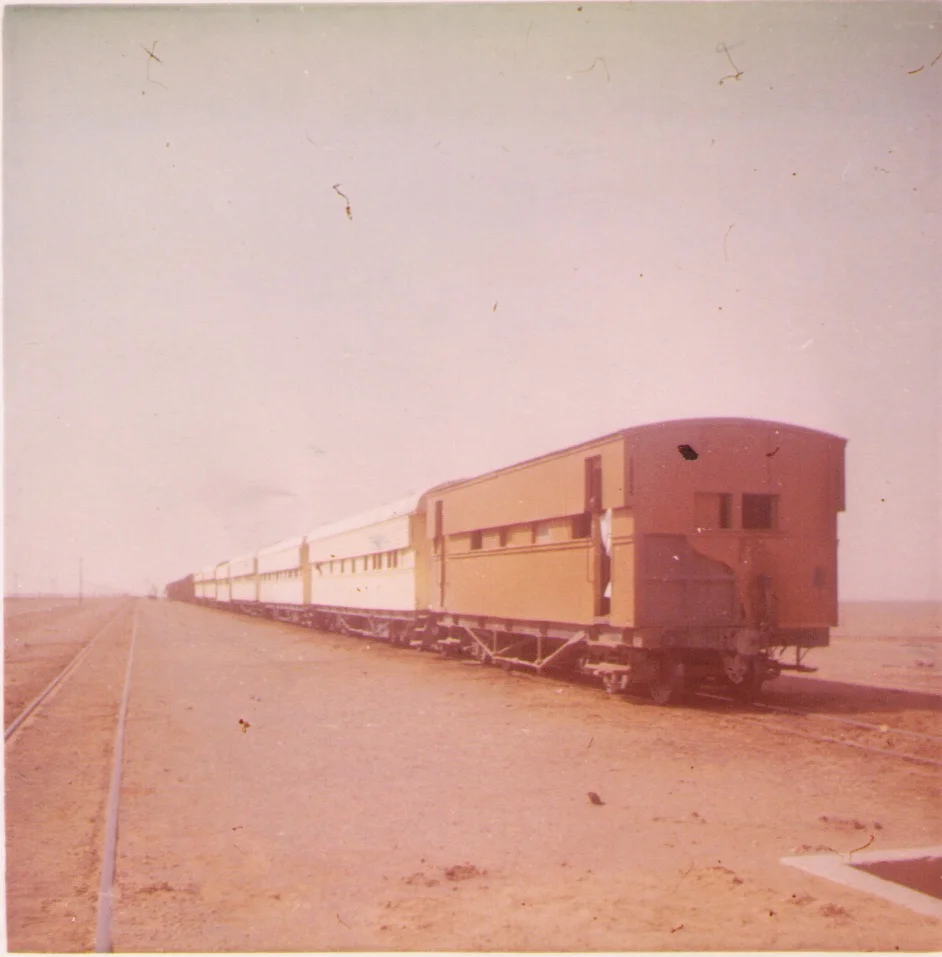Jailed in a Sudanese prison wasn’t what Mike Chambers imagined when he went to Africa. Then luck and the actions of one officer changed everything.
All in Rail Travel
An “Ugly American” Moment In Sudan
Pamela Blair, in the Sudan on the final leg of a long train voyage over a hot and empty desert, had prepared herself to be bored. It was what she hadn't planned on, however, that would forever change the way she saw the world and herself in it.
by Elyn Aviva
Rumbling vibration of Spanish high-speed AVE train, coming into the deep underground white glass-brick cement plaster metal station in Girona. Feet tingle on platform, train sloowwwwws waaaayyyyyyy dowwwwwwnnnn and coasts to stop. Sigh like a long-held outbreath as doors open, stairs unfold. Clack thump of discharging passengers maneuvering out and down and onto platform, luggage dangling.
We wait to get on. Impatience has a metallic feel.

Finding our seats, sinking in. Ahh. Whoosh of doors closing, train starting, gaining speed. 200 kms/hour. Fast. Train car is more or less silent, except for the gaggle of girls behind us, a before-wedding hen party heading to Barcelona. They sport puffy red heart pins on their sweaters, move grudgingly when I push through to the semi-circular toilet cubicle at the end.
Ground mist rises like whipped cream, hiding the dark green hills. Rain smears against the windows, streams rushing tumultuous but soundless, muddy swirling water caressing tree roots in a cold embrace.
200 kms/hour, now 150, now 50, now 6…. Slow sigh of arrival. Sants Estación, Barcelona. Hurry down the platform, up the escalator, across the station toward Metro entrance. Huge Metro map on wall, angular routes snaking over it, marking the underground root-network beneath the city. Choose your color, your number, your direction. Linea 5, sky blue, direction Vall de Hebron, intermediate node, Sagrada Familia. Repetitive thump squeak of footsteps on tile corridor, down one flight of stairs, onto slow moving escalator… Pause. Shift. Wait.
Tension builds. People jostle to buy tickets. Which way does the ticket arrow go in the machine to get through the gate? Will the baby buggy get caught in the vertical gyrating windmill turnstile? Why doesn’t it work? Put it in again. Lose a journey.
story and photos by Rachel Dickinson
A week before what would have been my parents sixtieth wedding anniversary I found myself heading to Quebec City and the Fairmont le Chateau Frontenac, the very hotel my parents stayed in on their honeymoon. I believed, at the time, that this was strictly coincidental, for I had no desire to recreate the beginning of a failed marriage, but a part of me also strongly suspected that there was no such thing as pure coincidence.
words + photos by Rachel Dickinson
In September I took a trip to Gaspe Peninsula in Quebec. And although I was really looking forward to seeing where the St. Lawrence River leaves the confines of its banks and flows into the ocean, one of the biggest draws for me was the night train from Montreal to Gaspe. Trains have always held a fascination for me, drawing on some part deep inside that really wants to live in the 19th century (although I’m not so much of a sentimentalist that I don’t know that 19th century train travel also involved lots of soot and hard seats).
Train travel is becoming, rapidly, as comfortable as an old shoe, and it takes the elegance of Union Station in Washington to remind me of the miracle of this way of moving along the ground.
 But first, we stand for a long time in freezing drizzle in the Amtrak station in Richmond, modernized to dreariness, although the old photographs on the walls of the waiting room attest to the day when this was a major terminus. In those decades, eighty or more years ago, three train tracks crossed here, bearing engines and their massive loads, human and material, north, south and west. During the War, as my a historical Richmond grandmother called it, a major Union objective was to choke off these rail lines that were carrying supplies to the beleaguered Confederacy. All that is reduced to a shadow, now; only a few travelers wait to board when the train crawls in from Newport News.
But first, we stand for a long time in freezing drizzle in the Amtrak station in Richmond, modernized to dreariness, although the old photographs on the walls of the waiting room attest to the day when this was a major terminus. In those decades, eighty or more years ago, three train tracks crossed here, bearing engines and their massive loads, human and material, north, south and west. During the War, as my a historical Richmond grandmother called it, a major Union objective was to choke off these rail lines that were carrying supplies to the beleaguered Confederacy. All that is reduced to a shadow, now; only a few travelers wait to board when the train crawls in from Newport News.
The roommate and I are growing particular. The bedroom I reserved, which seemed so well appointed on the leg from Florida to Richmond, now promises to be horribly cramped. We try, at the ticket window in Union Station, to upgrade—in airline lingo—to a bedroom, which has actual beds and a bathroom, but the additional cost would be almost a thousand dollars, out of reach for nearly everyone traveling by rail. These bedrooms remain mostly empty, and it seems to me that Amtrak might reconsider what they are charging.
In the diner car somewhere in Georgia, Keith, the kindly, amused and amusing steward, explains the exigencies of Amtrak, under funded, according to Jimmie, the sleeping car porter, since its inception.
 “Did they get rid of your chefs?” I ask Keith, having heard on an earlier east-west trip that chef losing had been one of Amtrak’s attempts at economy.
“Did they get rid of your chefs?” I ask Keith, having heard on an earlier east-west trip that chef losing had been one of Amtrak’s attempts at economy.
“Not our chefs but our chef’s helpers, the ones who used to make salads, things like that, and wash dishes, the same time they got rid of china and glasses and linen table clothes. Now we just wash the wine glasses and the knives and forks and throw everything else away—a big waste,” he adds, before I can comment on the vast bags of non-recycled trash the new system must produce.
I commiserate before going back to the dinner menu.
“I recommend the steak,” the big, brightly colored and adorned woman next to me says with authority. The steak is amply promoted on the menu, its description outclassing the chicken, pasta and seafood, so I order it and it is delicious, as well as free. Our first class tickets entitle us to three meals a day.
My seatmate is traveling from Miami to her home in New Jersey. She speaks with a familiar accent. When the roommate who refuses to bow to political correctness asks her if she’s from Mexico, she replies with a flash of pride, “Cuba”.

